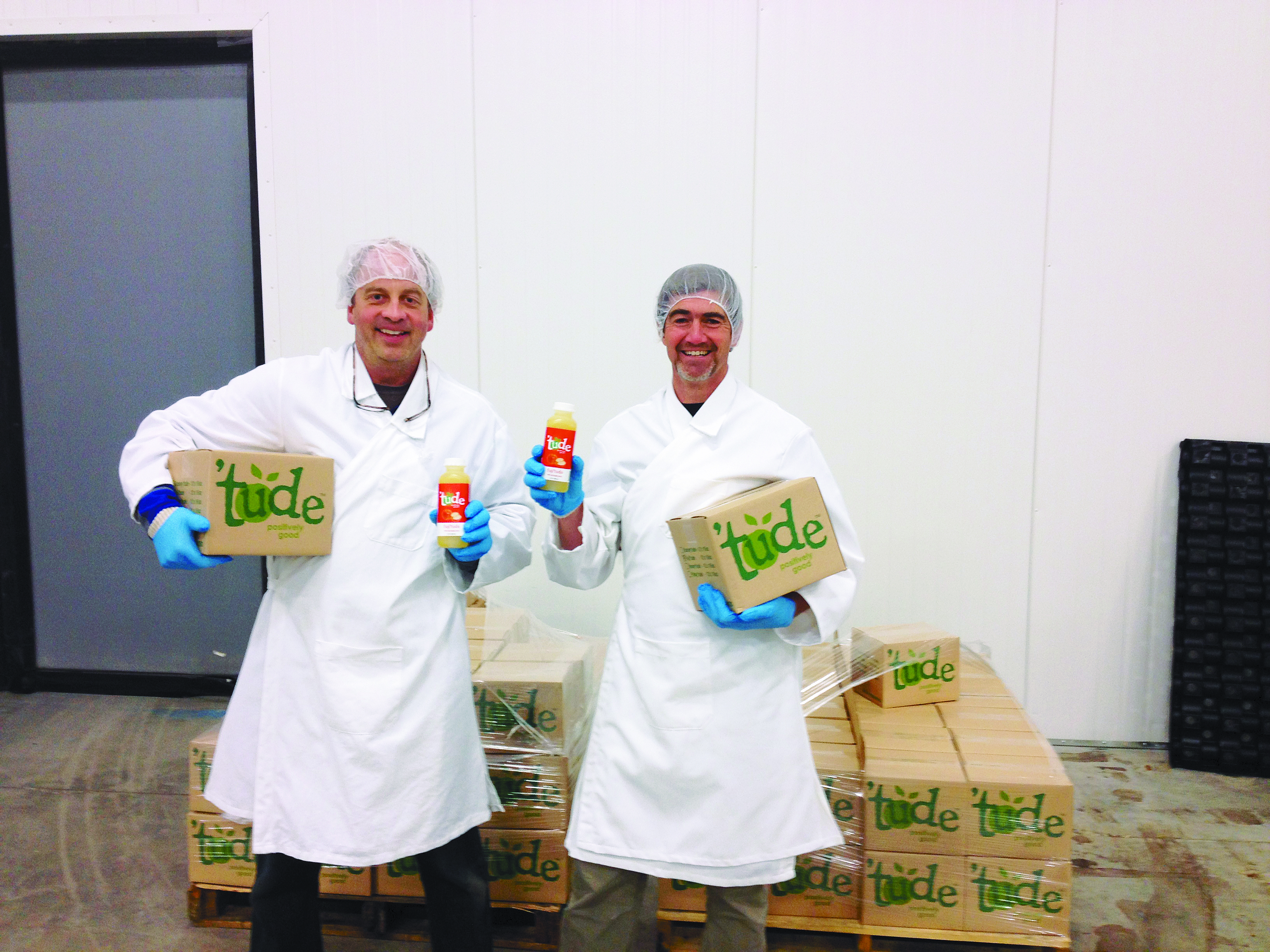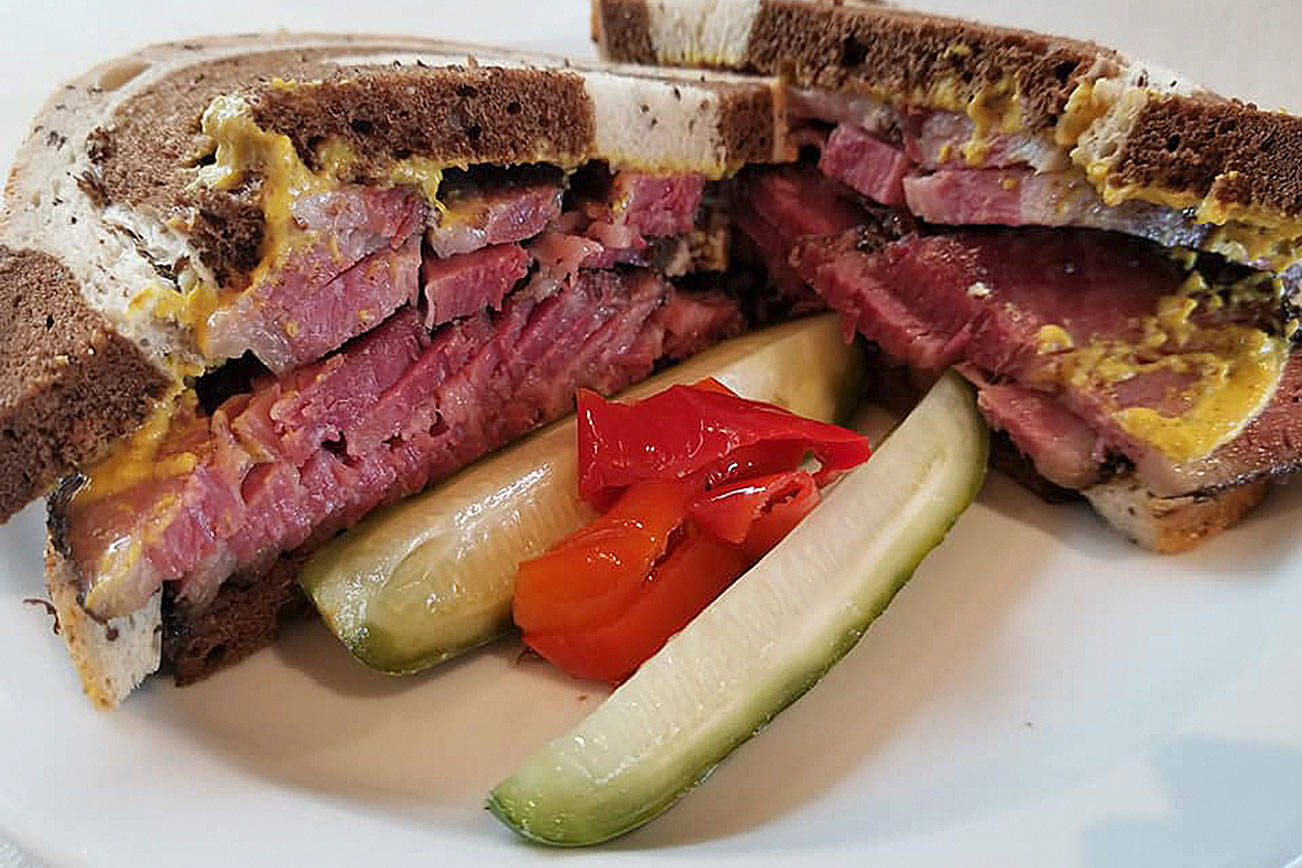Students don’t give their teachers apples anymore, but if they gave one to Andy Knowlton, he’d probably juice it.
Knowlton is a co-founder of ’Tude Juice, a Prosser, Wash.-based juice company that has deconstructed the very idea of apple juice. Who knew that was possible?
Instead of the standard, lovable clear amber liquid or the brown apple montage you find at farmers markets, ’Tude features the flavors of single varietal apples, including Gala, Fuji, Honeycrisp, Granny Smith, and Cripps Pink. That’s probably why it costs a little more, and tastes a little better, than others.
“We knew people have a favorite apple,” says Knowlton. “You talk with someone: ‘I love Granny Smith apples. Honeycrisps are my favorite.’ So let’s give a connoisseur the true taste of what that apple tastes like in liquid form.” He adds, “I’ve had tons of people say to me, ‘I will never go back to regular apple juice.’ ”
The reaction is understandable. I will sometimes go back to regular, non-postmodern apple juice—mostly when I need plenty of it to brine pork.
A former schoolteacher, Knowlton found himself looking for a change, and became friends with Cedric Chastenet, a condiment and olive importer who luckily was also looking for a change. Usually in this situation, a band is formed. That’s not the case here.
One day, Chastenet was at Knowlton’s place, watching him press some juice from a Granny Smith apple. “He said, ‘This is really good. Have you ever seen a green-apple juice on the market?’ ” Knowlton hadn’t. “And that precipitated a conversation,” says Knowlton.
Over the next few months, the two learned a great deal about apples and varieties, as well as the high-pressure processing technology that avoids heat, which is said to preserve nutrients and flavor.
“We thought how unique it would be to have an apple juice that was varietal-driven,” says Knowlton. “Washington has such a great history with apples. Everyone thinks of apple juice as the clear amber stuff, but no, apple juice can really be—” He interrupts himself. “We don’t even call it apple juice, we call it juice from an apple,” which is fine, though I really want to know what apple juice can be. He sort of leaves me hanging. (Wine?)
Knowlton and Chastenet initially purchased specialized juicing machines that they thought would fit their needs. Their first attempt at production unfortunately left them with an empty factory full of pipes and hanging wires.
“We were kind of naive,” says Knowlton. “We tried for three months to get the juicing machines to work to our liking, and it didn’t work, so all of a sudden the money that we took out of retirement and put towards this project was in the balance.”
They eventually managed to acquire new equipment and find the formulation they liked, “and then we were kind of in the business of making juice.”
Andy Knowlton and Cedric Chastenet hard at work. Courtesy ‘Tude Juice
The “ ’Tude” in ’Tude Juice is short for Knowlton and Chastenet’s positive “Life is good” attitude. (Though according to scrabblefinder.com, at least 43 other words end with “-tude,” like decrepitude, solitude, and servitude. Those probably wouldn’t have made sense.)
A Metropolitan Market in Seattle was the duo’s first customer, and now the juice is sold in 40 states through Whole Foods and other retailers. The product line has expanded into hybrid juices that use apple as the base, including marionberry, blueberry, ginger and turmeric, and lemonade, among others. They even sell an old-fashioned apple juice that combines different apples.
“Which apples do you use for that blend?” I ask.
“That’s proprietary,” says Knowlton, laughing. “I don’t want to give my recipe away.”
’Tude’s most popular flavors are Fuji and Granny Smith, at opposite ends of the taste spectrum. “People either love or hate the Granny Smith,” says Knowlton, which I can appreciate, because its tartness, accurately capturing the apple’s flavor, is striking. (Drinking it, I was reminded of that scene in Willy Wonka and the Chocolate Factory when Gene Wilder is instructing the kids to lick the fruity wallpaper: “The strawberries taste like strawberries. The snozzberries taste like snozzberries.” Anyway.)
Knowlton has no immediate plans to take the single-varietal approach to other fruits, like oranges or snozzberries, but he does have a research and development department, and is looking into it.
For now, it remains to be seen what effect ’Tude will have on the cutthroat apple-juice industry. The original approach to flavor is certain to make waves, amber-colored waves.
“I’ve noticed a couple companies that have come out with varietal juices,” says Knowlton. “Now, I can’t lay any claim that we got that going, but it clearly has piqued some interest in apple circles.”
“Apple circles?” I ask.
“There are circles for everything.”
food@seattleweekly.com








